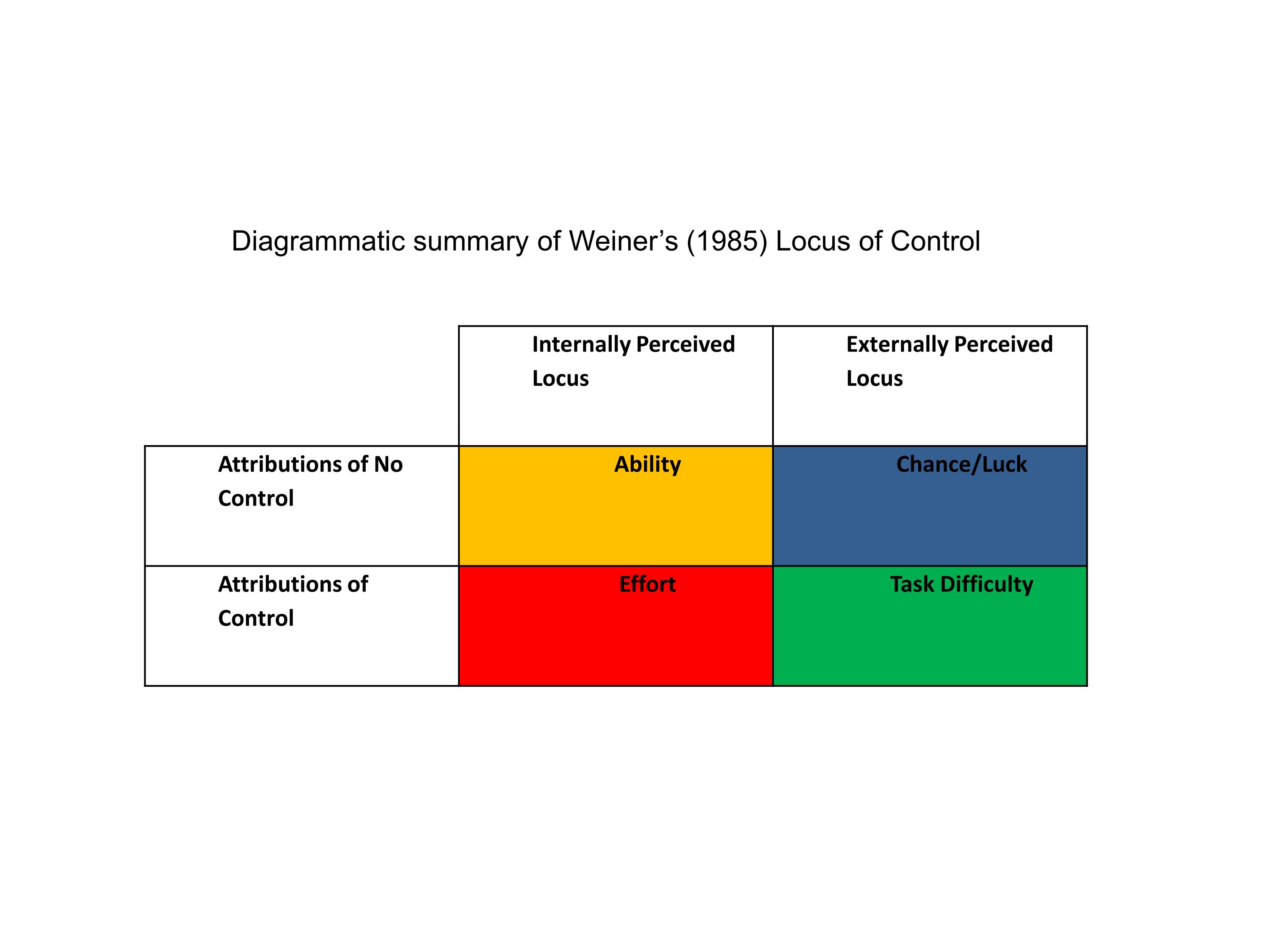Hope you are well today we are going through your attribution retraining, as it is the final week this will wrap everything up to increase your performance.
The attribution theory highlights the reasons we give for the performers performance to 4 sub categories.
These 4 categories are: Ability, Task difficulty, Effort and Luck.
Ability is whether you as the performer is whether you are good enough against the competitors or whether they are not good enough.
The task difficulty means were the opponents who they played against were too good or the expectation was too high.
Effort is dependent on the performers and if they knew the expectation which was not accomplished. This could be because the team and yourself was not prepared to play from training.
Luck is also crucial in the game because this can change the game for example winning the toss in football, and swapping sides and this causes you in the second half to have the wind with you.
Ability and task difficulty is seen as stable, because the ability which you possess does not change. Also task difficulty is stable because this is how the other team are going to compete. On the other hand effort and luck is perceived as unstable because this is something which you cannot control.
 |
| This is the Weiner's attribution model which is being explained above. |
Through conversations which we've had about the teams performance, you are very critical about your teammates but never yourself. When the team loses a game you are very quick to point out the mistakes from others, and feel as though you played the game of your life.
However when the team go on with success in games which you win, you will make statements such as "I was in form today." This is known as self-serving bias.
What we want to do is understand who is to blame when the team is successful and also unsuccessful. To begin with what you need to understand is how performances can affect two key factors. The first is expectancy and future motivation, this is in regards to the stability dimension and whether it can change. Therefore if something is stable it should be expected for the next game which you play, however if it is unstable this suggests its unpredictable and can change.
The second factor is known as emotion and self-confidence, as it can decrease motivation and self belief. This is dependant on whether it is due to internal factors or external factors. An example of this would be internal success which gathers pride that brings confidence, an internal failure would make the performer have guilt.
On the other hand external success would bring about the desire of being please but underwhelmed and external failure would make you feel cheated. However, internalising performance can be positive as you personally can control this factor. Whereas externalising performance means that the reason is uncontrollable and this may lead to a negative attitude and loss of control.
Now after understanding what attribution theory is what we want you to improve is having a better understanding on who is to blame. This does not mean I want you to point the finger to yourself however to become more realistic when criticising why you lost a game. The reason for why I am doing this is because it will only come to benefit you, this way you are not playing music into your own ears. You are being honest and this will allow you to realise, okay this wasn't the best game I've played so now I have to try harder at training because my speed was lacking.
This will also give you additional motivation, because you will also be able to conclude if you and the team were just not good enough with ability. You may also look at factors which you couldn't control, this isn't your fault or the teams and this will custom you to take losses on the chin knowing how to bounce back from them.
Therefore what I want you to do is set certain goals for yourself during the game, once you have finished the game go back to the goals check list. When you do so tick which goals you completed successfully and don't tick the ones which you didn't. Then look at the four factors and mark next to the goal which factor led to you not being able to achieve the goal. Once you have got your opinion marked, you should then ask a team mate for their opinion. Then you will be able to understand what needs working on and whether your efforts were the problem, or was it something which you could not control.
This will help you not only have a better critical self analysis of yourself and the games, but also help aide you into understanding what needs improving in your performances. Therefore it is important that you follow this weeks blog and I hope the other 5 blogs are still being used.
I hope these blogs have assisted you with your performances, and all the very best with your sports and college. Next time you see me in college a thank you and a box of chocolates will do.
Thanks for Your Time
Final sign off
Mohammed Yahyah Patel
http://www.simplypsychology.org/attribution-theory.html